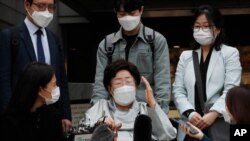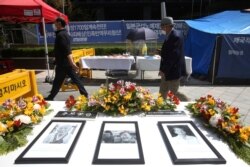A South Korean court has ruled against a group of women who were seeking compensation from Japan for being forced into prostitution by colonial Japanese forces during World War Two.
The judge at Seoul Central District Court said Wednesday that Japan is immune from civil lawsuits filed in another country under the concept of international law, adding that lifting the immunity would spark an inevitable diplomatic clash.
One of the original 20 plaintiffs in the case, 92-year-old Lee Yong-soo, denounced the decision outside the courtroom and vowed the group will take the case to the International Court of Justice.
In a separate case back in January, a different judge ruled in favor of a group of 12 so-called “comfort women” and ordered Tokyo to pay more than $89,000 each to compensate for their wartime suffering. Japan angrily criticized the earlier decision on the grounds that it had settled the issue under a 1965 treaty that normalized bilateral relations with Seoul that included $800 million in reparations, as well as a separate deal reached in 2015.
In Tokyo, Japanese Chief Cabinet Secretary Katunobu Kato refused to comment on the new case, citing the need to examine it further, but said the ruling in the previous case was “extremely regrettable and unacceptable” as it violated international law.
Relations between the East Asian neighbors have grown acrimonious in recent years over South Korea’s lingering bitterness over Japan’s brutal colonial occupation of the Korean peninsula from 1910-45, when Japan surrendered to the Allied forces to bring an end to World War Two. In addition to the scores of Korean women forced to work in Japanese military brothels during the war, thousands of Koreans were also forced to work in Japanese factories during that time.
South Korea’s Supreme Court issued a ruling last August that ordered the seizure of assets of Japan’s Nippon Steel to compensate four South Koreans who were forced into labor by Japanese forces.






